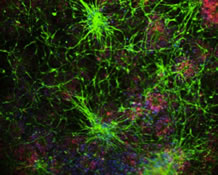Columbia University
Irving Medical Center
Neurological Institute
710 West 168th Street, 3rd floor
(212) 305-1818
Patient Care
Memory Disorder Centers

Edward D. Huey, M.D.
Associate Professor of Psychiatry and Neurology (in the Taub Institute)
Phone: (212) 305-1134
Fax: (212) 305-2426
Email: edh2126@columbia.edu
Edward (Ted) Huey, M.D. is an Associate Professor of Psychiatry and Neurology at Columbia University College of Physicians and Surgeons (New York, NY), in the Departments of Psychiatry (Division of Geriatric Psychiatry) and Neurology (Division of Aging and Dementia), the Taub Institute for Research on Alzheimer's Disease and the Aging Brain, and the Gertrude H. Sergievsky Center.
Dr. Huey obtained his B.A. in psychology from Yale University. He received his medical degree from the Stanford University School of Medicine in 1999. He completed an internship and a residency in Adult Psychiatry at the Stanford University Medical Center in Stanford, California. He was elected to be the chief resident for the program in his final year of residency. He then completed a clinical research fellowship and was an Assistant Clinical Investigator in the Cognitive Neuroscience Section of the National Institute of Neurological Disorders and Stroke in the National Institutes of Health in Bethesda, MD. He was then the Director of Clinical Science of the Litwin-Zucker Research Center for the Study of Alzheimer's Disease and Memory Disorders of the Feinstein Institute, North-Shore / Long Island Jewish Medical Center. He joined the Columbia University faculty in 2010.
Dr. Huey's research has focused on patients with frontotemporal lobar degeneration (FTLD) and related disorders. He studies the genetics of FTLD and is interested in the range of phenotypes associated with mutations that can cause FTLD. He also uses imaging in patients with FTLD and brain injury to explore the neuroanatomy of complex behavior, neuropsychiatric symptoms, and emotion in patients with brain dysfunction. A third interest is in the role of the dopamine system in the pathogenesis and treatment of the symptoms of FTLD. He is the recipient of a NIH / NINDS Pathway to Independence Award to research novel medication treatments and imaging biomarkers for FTLD. He sees patients in the Lucy G. Moses Center for Memory and Behavioral Disorders of the Neurological Institute and in the Memory Disorders Center of the New York State Psychiatric Institute.

